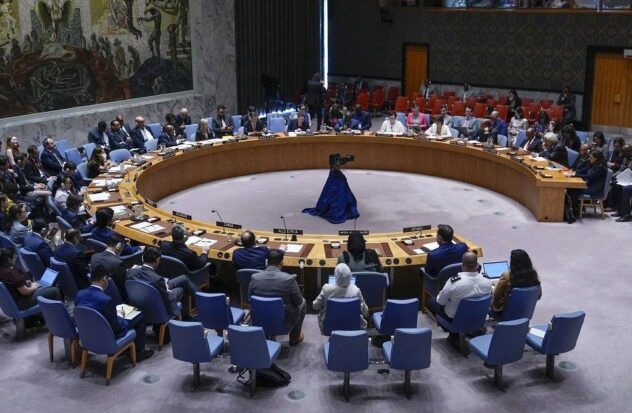UNITED NATIONS.- The United States urged the United Nations Security Council on Monday to support the three-phase plan announced by President Joe Biden to end the nearly eight months of war in Gaza, free all hostages and send large shipments of Help the devastated territory.
U.S. Ambassador Linda Thomas-Greenfield said the United States had distributed a draft resolution to the other 14 council members to back the proposal to end the conflict sparked by Hamas’ surprise attack in southern Israel on October 7, when about 1,200 people, mostly Israeli civilians, died.
“Numerous leaders and governments, also in the region, have supported this plan and we ask the Security Council to join in calling for the implementation of this agreement without delay and without further conditions,” he said in a statement.
The brief draft, seen by The Associated Press, would accept the May 31 deal announced by Biden and ask Hamas “to accept it in its entirety and implement its terms without delay and without condition.” Hamas has said it views the proposal “positively.”
The text did not mention Israeli acceptance of the agreement.
When Biden made his announcement, he described it as an Israeli offer that includes “a lasting ceasefire” and an Israeli withdrawal from Gaza if Hamas releases all the hostages it holds.
Israeli Prime Minister Benjamin Netanyahu told his combative government partners on Monday that the proposal announced by Biden would achieve the Israeli goal of destroying Hamas, according to local media. Ultranationalists have threatened to bring down his government if Netanyahu accepts a deal that does not eliminate Hamas.
Netanyahu told the Defense and Foreign Affairs Committee on Monday that Biden had commented on the general terms of the deal but not all the details, noting there were “gaps.”
What does the proposal contemplate?
For his part, Biden said the first phase of the proposal would last six weeks, with a “full and complete ceasefire,” a withdrawal of Israeli forces from all populated areas of Gaza and the release of some hostages, including women. , elderly and wounded, in exchange for hundreds of Palestinian prisoners.
The American hostages would be released in this phase, and the remains of deceased hostages would be returned to their families. There would be an increase in humanitarian assistance, with 600 entering Gaza each day.
In the second phase all other living captives, including soldiers, would be released and Israeli forces would withdraw from Gaza. Biden said that if Hamas follows through on its commitments, the temporary ceasefire would become a “permanent cessation of hostilities.”
Some 250 people, mostly Israeli civilians, were kidnapped on October 7. More than 100 were freed during a brief truce in late December and early December. Israel believes that there are about 80 people still being held, in addition to the remains of about 43 deceased.
Israeli bombings and ground offensives in Hamas-ruled Gaza have killed more than 36,000 Palestinians, according to Gaza’s Health Ministry, which does not distinguish between combatants and civilians. The figure has not been verified.
The third phase The plan announced by Biden contemplates the beginning of a major reconstruction of Gaza, which faces decades of recovery work after the destruction caused by the war.
The draft resolution stresses the importance of Israel and Hamas complying with the terms once accepted, “with the goal of bringing about a permanent cessation of hostilities, and calls on all member states and the United Nations to support its implementation.”
The draft also reiterates the council’s “firm commitment” to a two-state solution and stresses the importance of unifying the Gaza Strip and West Bank under a Palestinian Authority administration.
Thomas-Greenfield, the U.S. ambassador, said Security Council members “have continually called for the measures included in this agreement: bringing the hostages home, ensuring a complete ceasefire, allowing an increase in humanitarian aid to Gaza and the restoration of essential services, as well as laying the foundations for a long-term reconstruction plan for Gaza.”
“Council members cannot pass up this opportunity,” he said. “We must speak with one voice in support of this agreement.”
The foreign ministers of five major Arab countries — Jordan, the United Arab Emirates, Saudi Arabia, Qatar and Egypt — urged Israel and Hamas to consider Biden’s proposal “in a serious and positive manner.”
The group of seven major industrialized countries — the United States, the United Kingdom, France, Germany, Japan, Canada and Italy — also backed the ceasefire plan.
Source: With information from AP


